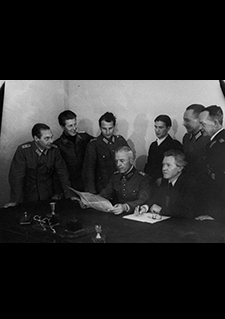The National Committee for “Free Germany”
Camp 27 for German prisoners of war was located in Krasnogorsk near Moscow. A small special camp under the control of the Soviet military intelligence service, the GRU, was attached to it. At the initiative of Soviet leadership, a collective movement, the National Committee for “Free Germany” (NKFD) was founded at this special camp, Lunyovo, on July 13, 1943.
In addition to leading representatives of German Communist émigrés in Moscow, the committee’s thirty-eight founding members included German prisoners of war from several camps for officers and for soldiers of other ranks and included the Protestant pastor Matthäus Klein and the Catholic theology student Jakob Eschborn.
At the assembly, Klein declared, I am addressing my urgent appeal in this hour to all of you on behalf of the Protestant church in Germany: Vent your hatred and your righteous indignation so that a storm of passion inflames you and moves you to courageous action against the enemy of all humankind. Dealing a blow to Hitler and his system ought to be our greatest satisfaction, creating the free and independent Germany our greatest honor (Drobisch, p. 122).
German émigrés had spread political propaganda among German prisoners of war before the events in Stalingrad without great success. The military catastrophe on the Volga caused a change in morale among many German prisoners of war, however: They felt betrayed by Hitler. This made some of them receptive to the NKFD’s cause. By getting involved themselves, they hoped to yet spare the German people from the worst. Some German prisoners of war joined the NKFD out of conviction, others hoped membership would improve their own situation. Their motives presumably overlapped as well.
Leading Communist émigrés such as Wilhelm Pieck and Walter Ulbricht had significant influence in the NKFD and increasingly made the NKFD a mouthpiece of Soviet policies. A few months after the committee had been founded in the Soviet Union, single smaller groups such as the “Free Germany Movement for the West” in France and the Benelux countries were formed in occupied territories as well as in neutral Sweden and Switzerland.

